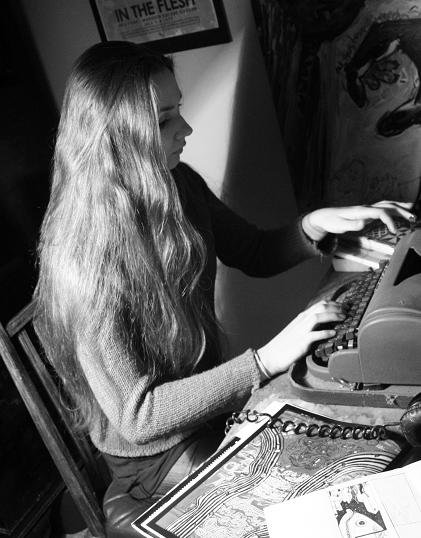“Translating in Russian is not the same as in Spanish/ Translating between the two languages/ Doubly impossible”. With these verses, Natalia Litvinova summarises her stance towards life as a Spanish writer and a Russian translator, two literary worlds that have met, for a fraction of a second, at Meeting Halfway.
Thinking about Natalia Litvinova is like remembering those childhood moments where we discovered, for the first time, that if we painted with yellow wax over blue then it would create a new colour.
With the permission of Federico García Lorca, we can say that Litvinova is the colour green inside the colour pallete of poetry. She has taken advantage of her Belarusian roots, which have been watered down by living in Argentina for more than half of her life to create poems like this:
Crying out, so to speak
I was given the gift to go into the furthest possible
But not returning
It is not birch. It is I who shudders under your skin.
Translating in Russian is not the same as Spanish
Translating in the two languages
Doubly impossible
Natalia Litvinova (from ‘Split’)
This poem will be translated in Meeting Halfway in more than 10 languages (Italian, Turkish, German…). Do you think that it will be the same poem in each language?
No it won’t be the same poem. Each version will produce its own accent, another climate, rhythm, more humidity, dryness or hardness, and flair.
You were born in the same year as the Chernobyl disaster in 1986. Has this affected you in any part of your life?
It was one of the reasons for which we emigrated to Argentina. Chernobyl affected my language, my childhood, my memories, and my syntax. It is an event that is very much present in my life. Many classmates and children of my age, stayed in Gomel after the Chernobyl disaster, and they died of various illnesses caused by the radiation. Somehow, a part of me died with them, accompanying them.
When you arrived in Argentina, at 10 years old, could you speak Spanish?
No, I couldn’t. Only the word “Hola”. I remember that not being able to speak the language filled me with shame. I felt embarrassed all the time, even with gestures. I turned into a quiet girl.
Did you find the learning process difficult?
Children learn faster. The daughter of my neighbours played with me and taught me, and I learnt this way, through pictures that she had in a textbook and then I would remember the accompanying word. I would memorise the lessons that were given in school so I wouldn’t have to repeat a year. I listened to my voice without being able to understand it, although it sounds strange, I thought I could see my voice roll through the air, everything was strange for me.
I have always thought that the moment you start reading poetry in another language, you’ve reached the “summit” of learning, because poetry is like the soul of language, it’s the most difficult thing to understand. When did you start to understand poetry in Spanish?
I didn’t understand poetry. Its grace was so tremendous. Poetry quivered within me in the way music makes me tremble. I don’t understand music. It expands inside me like a fungus, like moss. It redefines me. It makes me vulnerable and powerful at the same time.
And when did you start to write your own poetry in Spanish?
At 13 or 14 years old, after having read Lorca in the library in the basement of my school. The music of his poems poisoned me; I was under poetry like a a spell, a potion that I needed to recreate again and again to make the magic last a little longer.
Why did you decide to write in Spanish instead of Russian?
Because, maybe, I thought subconsciously that I wanted someone to read them at some point, because I thought of sharing my poems with someone, so that someone could read them without looking at me and saying something.
Are there feelings or themes which you think are easier to write in one language or the other?
If a topic is easy then I do not dwell on it. I do not sniff at it, I don’t go back. If it is easy and there is no way that you can take each layer apart to reach total nudity… But now I think of it, I could wear it, right?
In your poem, ‘Your eyes have turned my ashtray’ you wrote, ‘I read the testament of Kafka only as a letter of love/ soon the snow will fall in Paris. In Russia also, another snowfall/ the Spring will arrive through the stomach’’. With your metaphor, you contradict another Argentine, Cortázar, in the sentence, “all of the fires, the fire”. What did you want to convey with this image?
With “Your eyes have turned my ashtray”, I wanted to express the locations of the snow that do not reach me. The snow in Russia, the country of my childhood, to which I cannot return, and the snow in Paris, the country of my lover, who had written this poem in secret. In my first book snow is the primary metaphor, as necessary as air, impalpable, impossible snow, like love, childhood and staying somewhere forever.
In your poems you often recall you childhood or feelings that seem very personal. Are you conscious, that whilst you are writing, that your secrets could end up being public?
There is neither fear nor discomfort that could slow down my writing. When ‘Esteparia’, my first book was in the process, the poems fell into each other, like matured fruit; it was something that could not be avoided. They joined and went through an extensive process of correction, still not even thinking about publishing. At this point I only knew for sure that if I didn’t write, I couldn’t take a train, shower or eat. Writing was necessary to fill my day.
Question of influence… What matters when writing poetry?
What if poetry is invasive? Many times I have sought to write poetry about something specific, I felt clever proposing a theme of a poem. And I end up losing. Poetry overwhelms me like the cry of a tribe calling, and I pay attention. Sometimes writing is like uprooting the days of the calendar to go towards all of the seasons. Also to go towards the present, to reveal it.
In addition to writing your poems, you translate others’ poems, from Russian to Spanish. What is your worst fear when translating poems?
When translating I take many things into consideration, such as not overdoing the poem, not giving it extra weight, listening to their music, their rhythm. I respect the silences that the poet has constructed in their poems. Translation is something that means travelling to the landscape of the poet, to feel their pulse, to go behind their humour, to the nature of their humour. And moreover, the translator works on their own demise.
Do you try to get to meet the author of what you are translating so that you know what they want to say exactly or do you prefer to translate from personal feelings that the verses have evoked?
I started translating poems that took my breath away, those that disturbed me enough to change my attitude, those that deprived me of rigidity and made me wobble. I wanted to share these works with my friends. Therefore I started to translate the Russian classics from poets of the Russian Silver Age and some others from the Golden Age. Nowadays I am discovering the Russian poets of my generation. I investigate their lives, I try to make ties, I look into their photos. I keep a collection of photos from all of the poets for whom I translate and I am incapable of sweeping them aside and not integrating them into my life.
You have also had your poems translated into French, because you “live” in both worlds. The translator and the translated… Where do you feel more comfortable?
I don’t feel comfort. The comfort calms me down. When my poems are translated I feel flattered, surprised, touched, lost and thinking about what no longer belongs to me. Being a translator doesn’t bring me comfort either and this excites me. Each translation brings new challenges, new dangers and a new language.
Which Russian poets would you recommend to us?
Aleksei Tsvetkov, Cherubina de Gabriak, Arkadi Kutilov, Vladislav Jodasevich, Osip Mandelstam, Innokenti Annenski, Velemir Jlebnikov, Marina Tsvetáieva… I could continue giving names for at least another ten days.
And Spanish language poets?
Miguel Ángel Bustos, L. M. Panero, César Vallejo, Edgar Bayley, Raúl Zurita, Néstor Perlongher, Jacobo Fijman, Selva Casal, Alejandra Pizarnik…
Now to finish… What is your favourite word in Russian and what does it mean?
In Russian I like the resounding words, those which sound like an insect humming or hissing.
And in Spanish?
“Abalorio” meaning trinket and “carámbano” meaning icicle, because when I say them, I laugh, because these two words are like music that has been sent from somewhere else.
http://www.youtube.com/watch?v=eP4NA3U2Yjo
Natalia Litvinova (Gomel, Belarus 1986) lived in Argentina since 1996. As a poet she has published ‘Esteparia’ (Ediciones del Dock, 2010, Argentina; Ártese quien pueda, 2013, España; Trópico Sur Editor, 2013, Uruguay; Llantodemudo ediciones, 2013 , Córdoba), la plaquette traducida al francés, ‘Balbuceo de la noche’ (Melón editora, 2012, Argentina), ‘Grieta’ (Gog y Magog ediciones, 2012, Argentina), ‘Cortes invisibles’ (Editorial Letras de Cartón, 2012 , Chile), ‘Rocío animal’ (La Pulga Renga, 2013, Argentina) y ‘Todo ajeno’ (Vaso roto, 2013, México-España). As a Russian translator she has compiled the following anthologies. ‘The noise of existence’ (Editorial Leviatán 2013) of the Russian poets Jodasevich and Esénin. ‘The broken mirror’ (Edited by Melón, 2013) of Cherubina of Gabriak, and ‘The anthology of Innokenti Ánnenski’, that will be edited under the stamp of Vaso Roto.
http://www.animalesenbruto.blogspot.de/
http://www.casajena.blogspot.de/
[crp]





Recent Comments